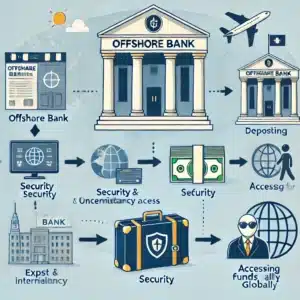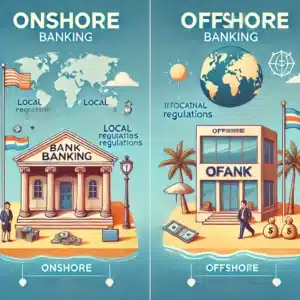In this post, we’ll discuss offshore bank accounts for expats. In particular, the topics we’ll cover include:
- What are offshore bank accounts for expats?
- How do offshore bank accounts work?
- Best places to open offshore bank account for expats
- Onshore vs offshore banking for expats
- Offshore bank account tax for expats
- Best offshore banks for expats
- Offshore bank accounts pros and cons for expats
If you are looking to invest as an expat or high-net-worth individual, which is what I specialize in, you can email me (advice@adamfayed.com) or WhatsApp (+44-7393-450-837).
Opening an offshore account usually includes certain requirements and steps that you might find confusing and need help with, so it would make sense to reach out for guidance.
What are offshore bank accounts for expats?
Foreigners living abroad can utilize offshore bank accounts to handle their money across borders and currencies, which makes them advantageous for receiving income, making international payments, and saving or investing.
Compared to onshore accounts, offshore ones have advantages including holding various currencies, better interest rates, and enhanced asset protection and anonymity.
How do offshore bank accounts work?

Expats typically have to meet minimum balance criteria, present identity documents, and reveal the source of their cash in order to open an offshore account to comply with anti-money laundering laws.
They should also make sure they notify the appropriate tax authorities of any income and interest they generate on such accounts, as well as any potential tax ramifications.
Strong banking infrastructure, advantageous privacy rules, and political and economic stability are the hallmarks of popular offshore banking destinations for foreign nationals.
Charges, minimum account balance requirements, currency options, and the expat’s unique requirements all play a role in selecting the best banks for offshore banking.
Best places to open offshore bank account for expats
- Switzerland is reputable for its data protection and political and economic backdrop. Asset protection and investment guidance are only two of the many services provided by Swiss banks, which makes the country a popular choice for overseas investors. While banking secrecy has been significantly reduced in the country due to international regulations, the country still retains a certain level of confidentiality.
- With an advanced banking setup, Singapore is regarded as a worldwide financial powerhouse. It provides contemporary financial technologies, generous taxation, and no capital restrictions. High-quality service and secrecy regarding clients are hallmarks of Singaporean banks.
- Being free of income, gift, inheritance, and capital gains taxes makes the Cayman Islands a well-liked offshore financial hub. Cayman Islands banks are appealing to offshore investors who wish to trim their tax obligations, as they provide insurance and offshore asset management services, among other solutions.
- The United Arab Emirates is growing as a tax-haven and politically stable international financial hub. Due to the UAE’s banks’ high standards and extensive service offerings, the country attracts expat investors looking for a Middle Eastern offshore banking hub.
- Belize has minimal deposit requirements for opening an offshore account, normally under $1k. Legal requirements for Belizean banks include maintaining high levels of liquidity for sustainability and facilitating remote account opening, which makes them easily accessible to foreign nationals.
- Strong financial secrecy regulations and a tax haven reputation have long been associated with Panama. Compared to numerous other jurisdictions, the nation still provides reasonably strong financial privacy safeguards, despite certain concessions made to increase transparency.
- A tiny island nation in the South Pacific, Vanuatu is regarded as one of the last tax havens with robust confidentiality in banking regulations and lax financial transparency standards.
Onshore vs offshore banking for expats
Setting up, maintaining, and processing fees for offshore accounts are typically more expensive than those for onshore ones. Depending on the financial organization and jurisdiction, these costs can differ dramatically.
Say, compared to their offshore equivalents, onshore accounts in locations like Singapore usually have cheaper and more explicit costs.
To meet the needs of clients globally, offshore accounts provide more flexibility and specialized services. Higher interest rates, greater privacy, and asset security are among features they offer. They can even manage multiple currencies.

On the other hand, the scope of onshore accounts is more constrained; they are mainly used to service local clients in compliance with national laws and regulations.
International payments, business banking, expat wealth management, and other financial services may be more widely accessible through offshore accounts.
When opening an offshore bank account, the minimum balance requirements are frequently greater than those for onshore bank accounts. Opening an offshore account is normally done online, but opening an onshore account usually requires more in-person steps.
Because of AML laws, offshore banks are also subject to more stringent know your customer standards.
Offshore bank account tax for expats
The income and interest received on offshore bank accounts are usually subject to reporting to the appropriate tax authorities, both in an expat’s home country and in the territory where they currently reside in.
In order to curb tax evasion, many nations like the US have legislation like the Foreign Account Tax Compliance Act that mandate foreign banks to provide details about accounts owned by its citizens. Significant fines and even criminal prosecution for tax evasion may result from improperly declaring income and assets in accounts offshore.
However, there are other tax breaks to offshore accounts. For example, in certain countries, interest can be earned tax-free up to a specific amount.
To make sure they are abiding by all applicable laws, expatriates must properly comprehend the tax regulations and reporting duties.
Best offshore banks for expats
Which institutions are the best when it comes to offering offshore bank accounts for expats vary according to specific needs, but the most popular ones are often categorized by the comprehensiveness of their products and services.
HSBC is among the biggest banks catering to foreign nationals. Their expat bank account is intended to make managing finances easier when handling several currencies and nations. Personalized features offered by HSBC Expat include access to extensive wealth management services.
Caye International Bank in Belize
When it comes to offshore banking, Caye stands out because of its dependable banking infrastructure, minimal deposit minimums, and remote account creation options. Foreign investors looking for easily accessible offshore banking services in Belize are its target market.
UOB
This bank is among the well-liked options in Singapore for offshore bank accounts for expats. It offers comprehensive banking services, with features like multi-currency accounts and practical online and mobile banking services. DBS and OCBC are other alternatives.
Offshore bank accounts pros and cons for expats
Offshore Bank Account Benefits
- Easily handling money in several currencies and nations.
- Ability to use accounts in different currencies to cover costs in multiple locations without having to pay currency conversion fees.
- Exclusive deals like cheap overseas transfers and seamless multi-currency bill payment.
- Possible tax benefits, depending on the offshore jurisdiction and the expat’s place of residence.
- Some offshore financial centers offer greater confidentiality and security for assets.
Risks of offshore banking for Expats
- High minimums to create an account.
- Potentially increased account maintenance and other costs.
- Tax reporting requirements to reveal interest and income from offshore accounts in applicable areas.
- Unfavorable views of offshore banking, such as links to money laundering.
Pained by financial indecision?

Adam is an internationally recognised author on financial matters with over 830million answer views on Quora, a widely sold book on Amazon, and a contributor on Forbes.



